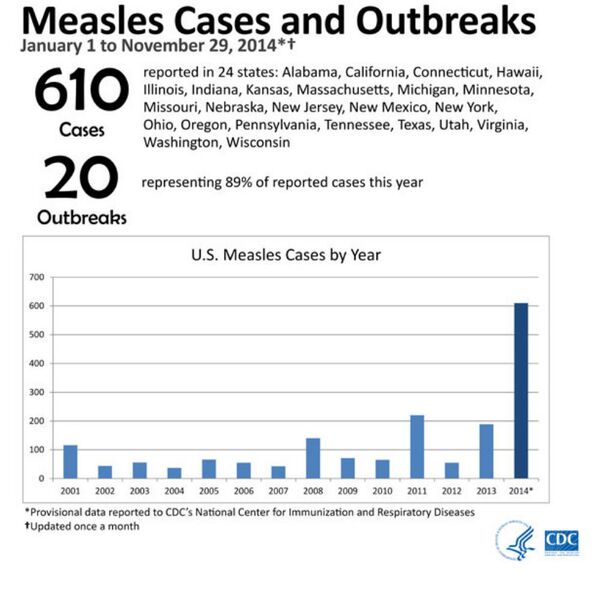The California Department of Health has confirmed that 21 infected persons in California had visited at least one of the two parks between December 15 and December 20, and identified another case in a person who had direct contact with one of these patients. Two more cases were reported in Utah, one in Colorado and another in the state of Washington. Four others are currently under investigation.
The majority of those infected hadn’t been vaccinated against the disease.
Health officials are concerned that thousands have been exposed to the potentially dangerous and highly contagious disease that can be spread easily through the air. The Disney parks attract tens of thousands of visitors a day, and that rate skyrockets around the holidays, one of the park’s busiest seasons.
“The biggest concern is you’re gonna have the potential for more outbreaks,” said Dr. Mark Zahn told CBS Baltimore.
Last year the U.S. saw the largest number of confirmed measles cases since 1994, reaching 288 in the first half of the year, the Centers for Disease Control and Prevention (CDC) reported. Nearly all of these cases have been associated with international travel by unvaccinated people.
"The current increase in measles cases is being driven by unvaccinated people, primarily U.S. residents, who got measles in other countries, brought the virus back to the United States and spread to others in communities where many people are not vaccinated," said Dr. Anne Schuchat, assistant surgeon general and director of CDC’s National Center for Immunizations and Respiratory Diseases, said in May 2014.

Dr. Bob Sears, a pediatrician who practices in Orange County near the Disney parks, is known for having a majority of patients who have not been vaccinated, largely because of parent fears that vaccinations can lead to serious disorders in children like autism.
He downplays the significance of the measles outbreak, telling patients on his website “there’s no need to panic. We agree that vaccination is important, but if you’ve chosen to skip the MMR vaccine, the current status of measles in our country is really very little different than usual, and the hype that you read in the media should not influence your decision.”
“You have to discuss the pros and the cons and most doctors only discuss the pros,” Sears continued. “Parents just don’t fear the diseases anymore and parents also don’t want their child to have a bad side effect.”
According to the CDC, the risk of a serious allergic reaction to vaccines is less than one in a million.
Measles can turn deadly for some kids, particularly those with other medical problems. The disease typically starts with a fever, cough, runny nose and red eyes, followed by a red rash that starts on the face and spreads downwards. Most people recover within a few weeks, but it can lead to blindness, encephalitis, severe diarrhea, ear infection and pneumonia in people with reduced immunity.



